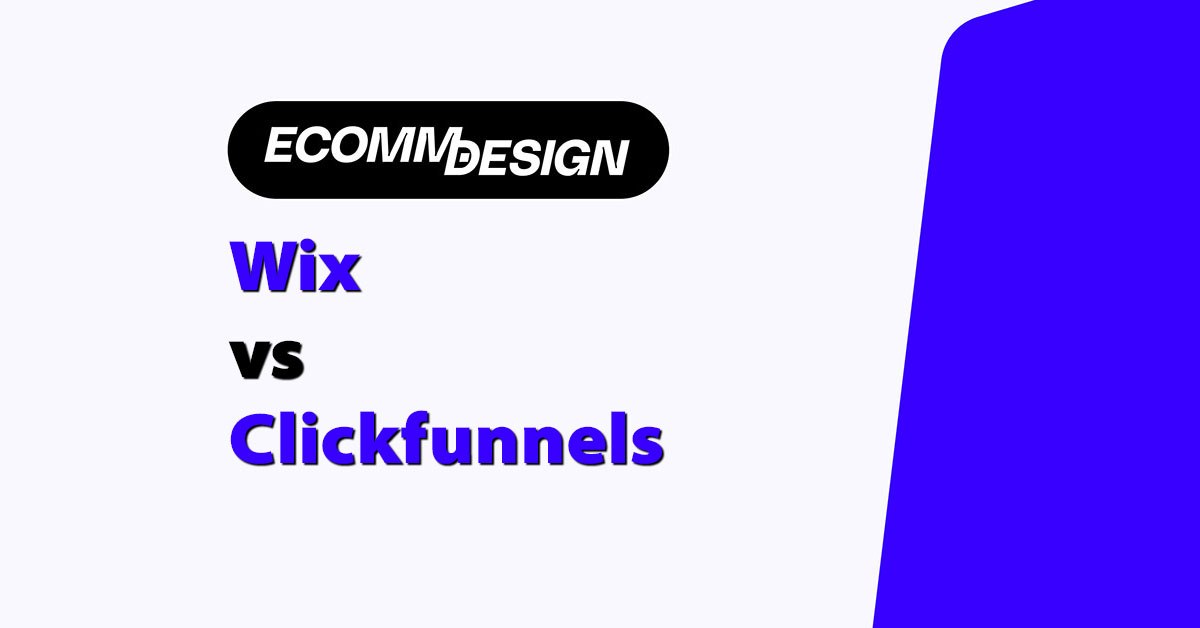
Wix vs ClickFunnels: Which is right for you?
I’ve spent more than a decade helping other ecommerce companies build websites, scale their brands, and increase their revenue.
One thing I’ve noticed? No matter how experienced an entrepreneur is, most have trouble choosing the right tools and platforms for their needs.
The trouble is, so many solutions (like Wix and ClickFunnels) offer similar things, from website builders, to marketing tools and ecommerce capabilities. The good news? Choosing between Wix and ClickFunnels is a lot easier than you might think.
Although both of these platforms have overlapping features – they serve very specific needs and use cases. With this comparison, I’ll show you how you can make the right choice for your company.
Quick Verdict: Wix or ClickFunnels?
Here’s the quick “TL;DR” verdict:
- Choose Wix: If you’re looking for a user-friendly website builder, great AI tools, intuitive ecommerce capabilities, and built-in marketing tools. It’s the easiest option for building virtually any type of website, with minimal effort.
- Choose ClickFunnels: If you want to create a comprehensive online business, and access tools that help you to drive customers to your brand, increase conversion rates, enhance your online reputation, and scale into new sectors.
Looking for slightly more information? Here are the key pros and cons I’ve noticed after using both of these platforms extensively:
Wix Pros
- Incredibly easy to use for beginners.
- Suitable for creating any type of website (including ecommerce stores).
- More affordable pricing for smaller companies.
- Intuitive Al features and marketing tools.
- Extensive integration options.
Wix Cons
- Limited options for creating comprehensive sales funnels.
- Not particularly scalable for larger companies.
ClickFunnels Pros
- Exceptional sales funnel capabilities.
- Powerful website building and ecommerce tools.
- Integrated email marketing and SEO solutions.
- In-built CRM for managing customer relationships.
- Great tools for creating online courses and membership sites.
ClickFunnels Cons
- More expensive pricing.
- Bigger learning curve for beginners.
Wix vs ClickFunnels: Comparing the Core Features
Here’s the thing, both ClickFunnels and Wix allow users to create websites, sell products online, design and implement marketing campaigns and more.
However, they’re actually two very different toolkits, with unique “target audiences”. Let’s take a look at their core features, side-by-side.
Website Builders and Sales Funnel
As mentioned above, both Wix and ClickFunnels offer access to “website building” tools.
Wix boasts one of the most user-friendly website builders around, with support for custom domains, appointment booking apps, and ecommerce capabilities.
You can create a website with AI in a matter of minutes, and customize more than 900 different website templates to suit your needs.
ClickFunnels’ website builder also offers drag-and-drop functionality, and a range of templates you can easily customize (although there are fewer options available than you’d get from Wix).
With both companies, you can create various types of websites – although ClickFunnels does offer more options for companies selling online courses, or building membership sites.
Wix is more tuned to the needs of companies that want to create a professional online presence (without necessarily selling anything), or merchants looking to sell a handful of products.
ClickFunnels, however, isn’t just a website builder, it’s a “sales funnel” creation toolkit.
While you can design simple sales funnels with Wix by building custom landing pages and sales pages, ClickFunnels goes above and beyond in this area.
You can design a huge range of different funnels with forms, landing pages, and templates optimized to boost conversions.
If your focus is on generating leads, collecting contact details, and selling as many products and services as possible, ClickFunnels is definitely the way to go.
Ecommerce: What You Can Sell with Wix and ClickFunnels
Wix is more than functional enough to support small ecommerce companies. With the platform, you can sell physical products, digital products, and subscriptions. You can also sell services, thanks to handy built-in features for scheduling appointments with clients.
ClickFunnels delivers all of the same ecommerce functionality as Wix, alongside some additional extras. You get pre-optimized checkout pages designed to boost conversions, and access to unique tools for building and selling unique products.
For instance, with ClickFunnels, you can create an online course with templates, and sell that course without using any third-party apps.
You can also create “membership sites” with ClickFunnels, with access to various management features, and tools for enhancing community interactions (like forums).
One other thing that makes ClickFunnels a little more appealing for larger ecommerce brands, is that it offers access to a more advanced “CRM” system. You can use this to track customer appointments, message clients directly, and track sales outcomes.
Wix does have it’s own CRM solution built-in, but there aren’t nearly as many tools for managing and nurturing customers.
Marketing, SEO, and Analytical Tools
From a marketing perspective, both Wix and ClickFunnels offer access to tools for email marketing, and search engine optimization. You can also align both tools with integrations to take advantage of PPC campaigns and social media strategies.
I do think ClickFunnels’ email marketing tools are a little better overall. You get more advanced solutions for collecting email addresses with landing pages, opt-in forms, and pop-ups.
You can also create automated email sequences that make it easier to nurture and consistently engage customers, without having to rely on a third-party tool like Klaviyo or MailChimp.
Wix seems to be slightly better from an SEO perspective, with fast-loading templates, and custom suggestions to help you boost your ranking potential.
Wix also offers access to AI tools that can help you to create content for marketing campaigns, blogs, and product pages much faster.
Unfortunately, Wix falls behind ClickFunnels again in terms of analytics and reporting insights.
Both of these tools support A/B testing and basic reports that allow you to track things like page views, opt-in rates, and click-through rates.
Wix even integrates with Google Analytics for even deeper insights into customer browsing sessions.
However, ClickFunnels gives you a much wider range of customizable reports, and deeper insights into customer actions across every stage of the sales funnel.
Wix vs ClickFunnels: AI, Integrations and Unique Features
Since AI has pretty much taken the entire world by storm, it’s probably no surprise that both Wix and ClickFunnels have their own intelligent features. Wix offers access to AI solutions that make it easy to create a website or produce content in a matter of seconds.
ClickFunnels’ AI tools are more focused on helping you to boost conversion rates. For instance, you can access a “Payments AI” solution that helps you automate and enhance transactions.
There’s also the ClickFunnels smart checkout (designed to boost average order values with strategic upselling and cross-selling), and AI-powered analytical tools.
In terms of integrations, both of these platforms are pretty flexible. ClickFunnels integrates with dozens of apps, from marketing automation tools like AWeber, ActiveCampaign and HubSpot, to tools for creating webinars, tracking sales, and boosting collaboration.
Wix integrates with most of the same apps, so you shouldn’t have a tough time aligning various parts of your business operations with either platform.
Wix Unique Features
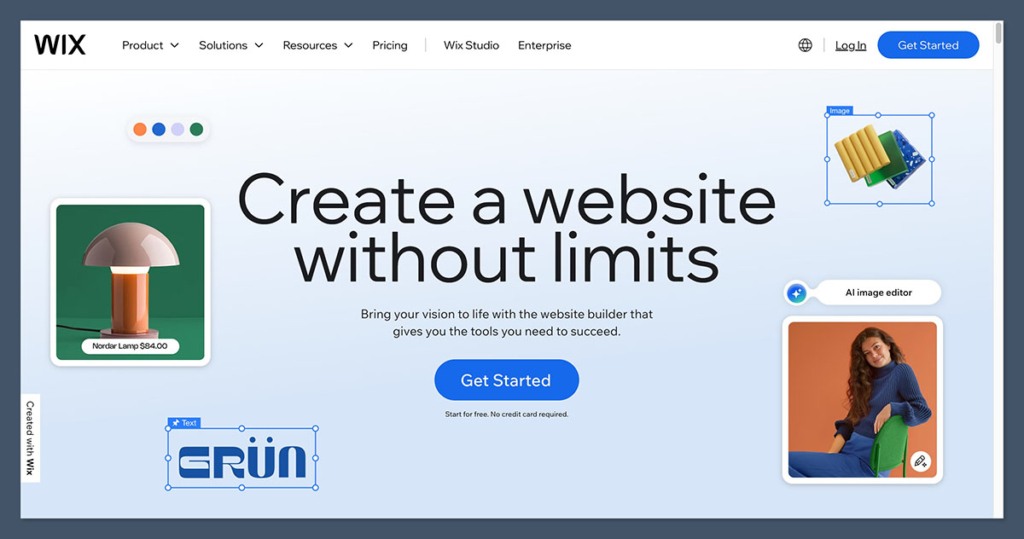
The “unique” features offered by Wix are tailored towards smaller companies getting started in the online space – just like the platform itself.
There’s a free logo maker for merchants building a new brand, as well as video, QR code, and business name generators.
You can even use Wix to create custom invoices for your clients.
However, Wix’s unique features don’t really distinguish it from other ecommerce platforms or website builders.
Solutions like Shopify offer similar tools, and give you access to more advanced capabilities for omnichannel selling and business management.
ClickFunnels Unique Features
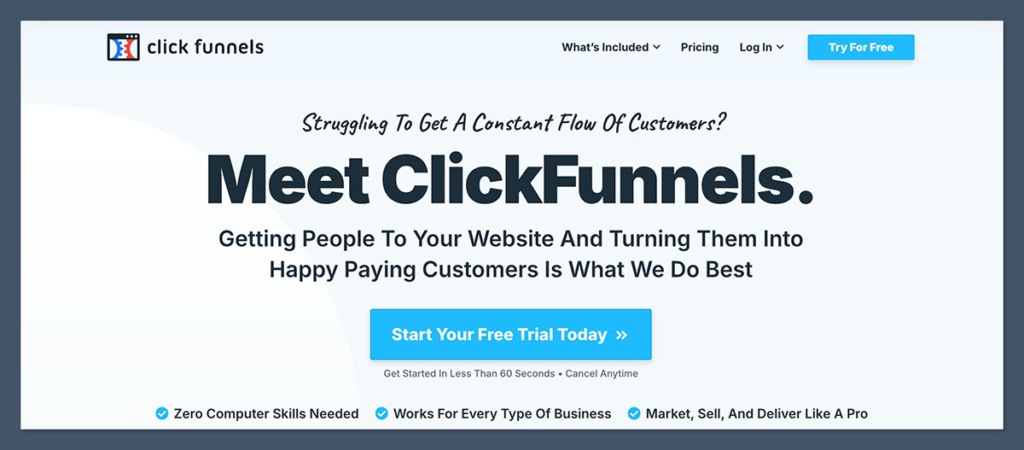
ClickFunnels’ special features are a lot more compelling if you’re looking for something more than just a basic website builder.
You can create comprehensive membership websites and online courses as mentioned above. Plus there are tools for:
- Building end-to-end automated workflows
- Creating and managing online communities
- End-to-end email marketing
- Customer relationship management and communication
- Pre-made templates for specific stages of the sales funnel
MORE:
Wix vs ClickFunnels: Ease of Use and Support
I mentioned in the “pros and cons” list I created above that one of Wix’s biggest benefits is how easy it is to use.
Although ClickFunnels has some intuitive features, such as its sales funnel templates and drag-and-drop website builder – Wix is much better for beginners.
You can create and customize a website in no time, with or without AI assistance, and leverage hundreds of one-click integrations with other tools.
ClickFunnels takes a little more time to master – particularly if you’re not used to building online sales funnels.
From a support perspective, both solutions are pretty similar. They both offer 24/7 support options (callback, email and live chat for Wix, and ticket, email, and live chat for ClickFunnels).
In my experience, ClickFunnels is a little slower at responding to questions, but it does have a stronger social media presence, if you’re looking for community-based support.
Plus, the guides and resources created by ClickFunnels are a lot more in-depth.
Wix vs ClickFunnels: Pricing Options
Both Wix and ClickFunnels have updated their pricing structure in recent years. There used to be a free version of Wix (which is no longer available), and ClickFunnels had three plans to choose from (now there’s only two).
Wix is still the cheaper option overall, with the “Light” plan starting at $17 per month for 2GB of storage space, access to basic marketing features, and the website builder.
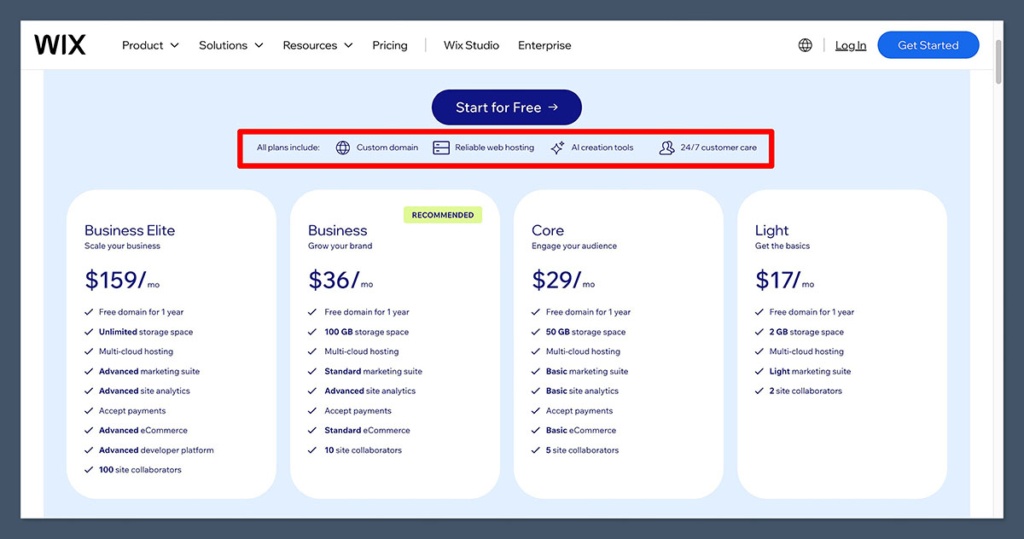
Other plans include:
- Core: Starting at $29 per month with 5GB of storage space, more marketing tools, basic ecommerce functionality, and simple site analytics (plus 5 collaborators).
- Business: Starting at $36 per month with 100GB of storage, more advanced marketing tools, standard ecommerce functionality, upgraded analytics, and 10 collaborators.
- Business Elite: Starting at $159 per month for unlimited storage, advanced marketing, ecommerce, and analytics tools, and access to a robust developer platform. You can also have up to 15 collaborators on your site.
ClickFunnels’ cheapest plan costs $97 per month – which makes it a lot more expensive than most of Wix’s plans. However, this plan does come with unlimited funnels, courses, members, contacts, pages, and domains, as well as 3 team members.
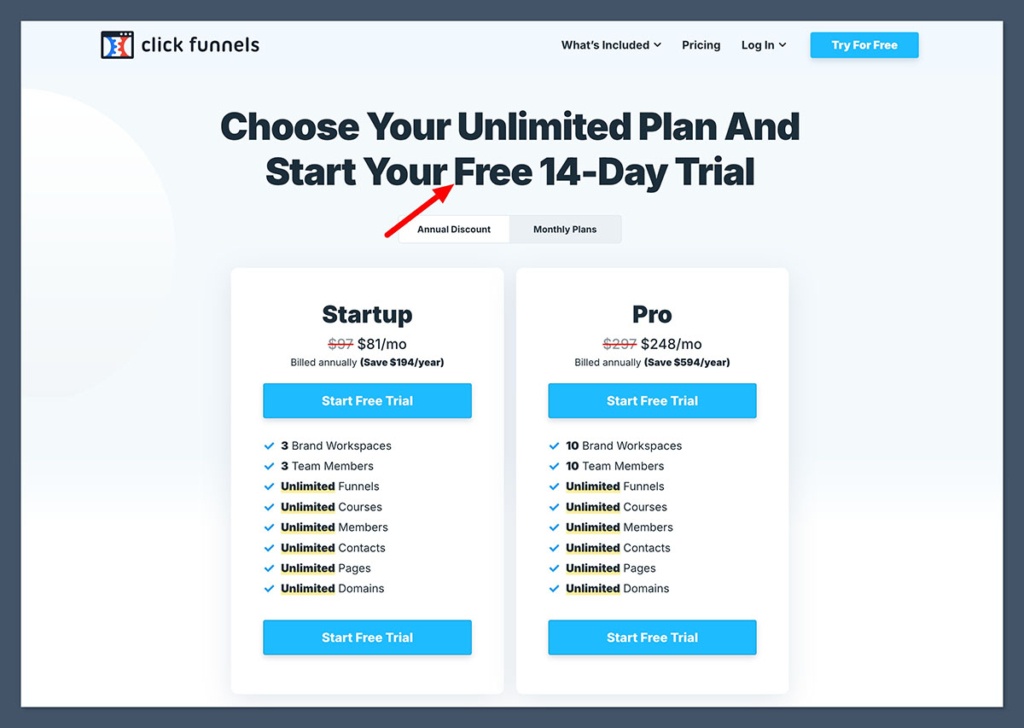
The “Pro plan” for $297 per month builds on the features of the cheapest plan with up to 10 workspaces and 10 team members.
Wix vs ClickFunnels: Which is Best?
Ultimately, whether you should choose Wix or ClickFunnels all depends on your needs and priorities.
ClickFunnels is clearly the more robust option if you’re focus is on accessing new leads, and driving sales – but it’s also more complex, and expensive (particularly for companies with simple needs).
Wix is the more user-friendly and affordable choice for those who just want to create a simple website and sell a handful of products. However, it’s a lot less appealing if you want extra help driving conversions, or you want to scale your online company.



